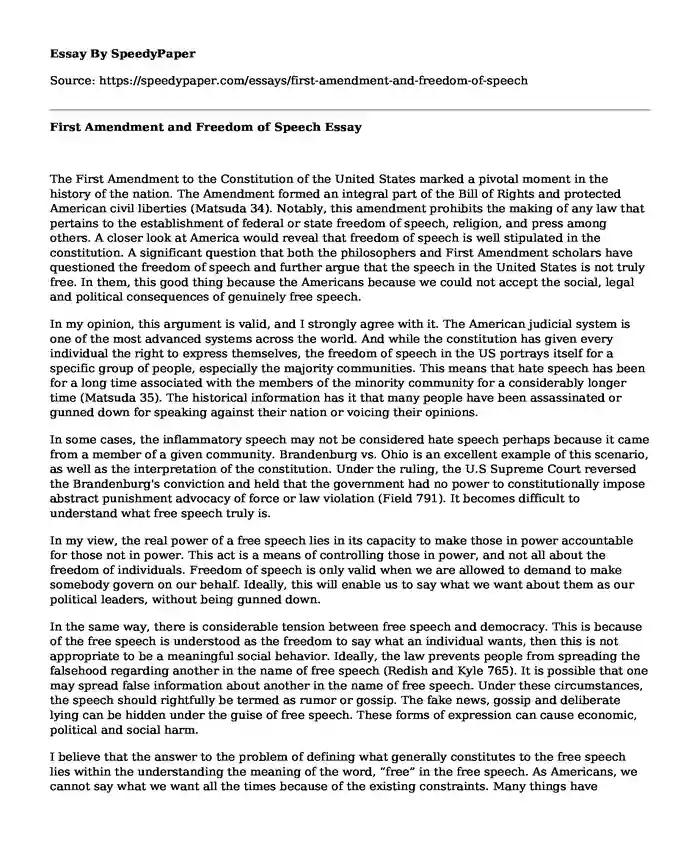The First Amendment to the Constitution of the United States marked a pivotal moment in the history of the nation. The Amendment formed an integral part of the Bill of Rights and protected American civil liberties (Matsuda 34). Notably, this amendment prohibits the making of any law that pertains to the establishment of federal or state freedom of speech, religion, and press among others. A closer look at America would reveal that freedom of speech is well stipulated in the constitution. A significant question that both the philosophers and First Amendment scholars have questioned the freedom of speech and further argue that the speech in the United States is not truly free. In them, this good thing because the Americans because we could not accept the social, legal and political consequences of genuinely free speech.
In my opinion, this argument is valid, and I strongly agree with it. The American judicial system is one of the most advanced systems across the world. And while the constitution has given every individual the right to express themselves, the freedom of speech in the US portrays itself for a specific group of people, especially the majority communities. This means that hate speech has been for a long time associated with the members of the minority community for a considerably longer time (Matsuda 35). The historical information has it that many people have been assassinated or gunned down for speaking against their nation or voicing their opinions.
In some cases, the inflammatory speech may not be considered hate speech perhaps because it came from a member of a given community. Brandenburg vs. Ohio is an excellent example of this scenario, as well as the interpretation of the constitution. Under the ruling, the U.S Supreme Court reversed the Brandenburg's conviction and held that the government had no power to constitutionally impose abstract punishment advocacy of force or law violation (Field 791). It becomes difficult to understand what free speech truly is.
In my view, the real power of a free speech lies in its capacity to make those in power accountable for those not in power. This act is a means of controlling those in power, and not all about the freedom of individuals. Freedom of speech is only valid when we are allowed to demand to make somebody govern on our behalf. Ideally, this will enable us to say what we want about them as our political leaders, without being gunned down.
In the same way, there is considerable tension between free speech and democracy. This is because of the free speech is understood as the freedom to say what an individual wants, then this is not appropriate to be a meaningful social behavior. Ideally, the law prevents people from spreading the falsehood regarding another in the name of free speech (Redish and Kyle 765). It is possible that one may spread false information about another in the name of free speech. Under these circumstances, the speech should rightfully be termed as rumor or gossip. The fake news, gossip and deliberate lying can be hidden under the guise of free speech. These forms of expression can cause economic, political and social harm.
I believe that the answer to the problem of defining what generally constitutes to the free speech lies within the understanding the meaning of the word, "free" in the free speech. As Americans, we cannot say what we want all the times because of the existing constraints. Many things have constrained us. These include the words, concepts and grammar, and physical barriers. We are further constrained by the biological and cognitive structures that are related to the thoughts and its expression through language. Surprisingly, we are also not free to say what we want socially, as we are further constrained.
Works Cited
Field, Martha A. "Brandenburg v. Ohio Its Relationship to Masses Publishing Co. v. Patten." Ariz. St. LJ 50 (2018): 791.
Matsuda, Mari J. Words that wound: Critical race theory, assaultive speech, and the first amendment. Routledge, 2018.
Redish, Martin H., and Kyle Voils. "False commercial speech and the First Amendment: understanding the implications of the equivalency principle." Wm. & Mary Bill Rts. J. 25 (2016): 765.
Cite this page
First Amendment and Freedom of Speech. (2022, Dec 30). Retrieved from https://speedypaper.net/essays/first-amendment-and-freedom-of-speech
Request Removal
If you are the original author of this essay and no longer wish to have it published on the SpeedyPaper website, please click below to request its removal:
- Free Essay Sample on Fitness Trackers
- Free Essay with Methodology and Assumptions for the US Population Projections
- Free Essay about Criminal Law Systems
- Evaluate the Increase in Tuition and if it will necessarily Cause a Rise in Revenue
- Free Essay: The Laws, Rules, and Principles Governing the Use of Force under International Law
- Infosoft - Business Plan Essay Sample
- Essay Example: Harmony between National Security and Freedom
Popular categories





